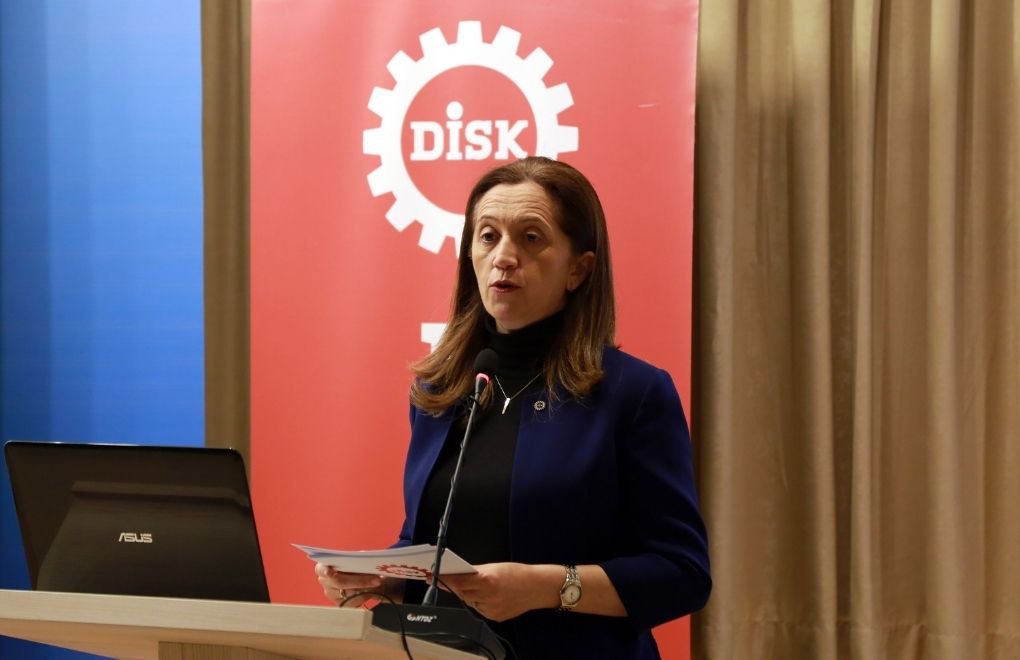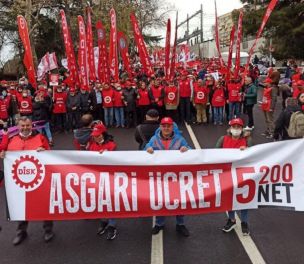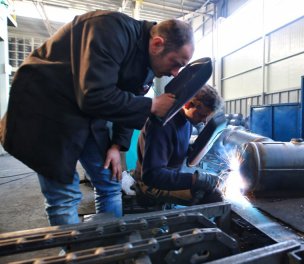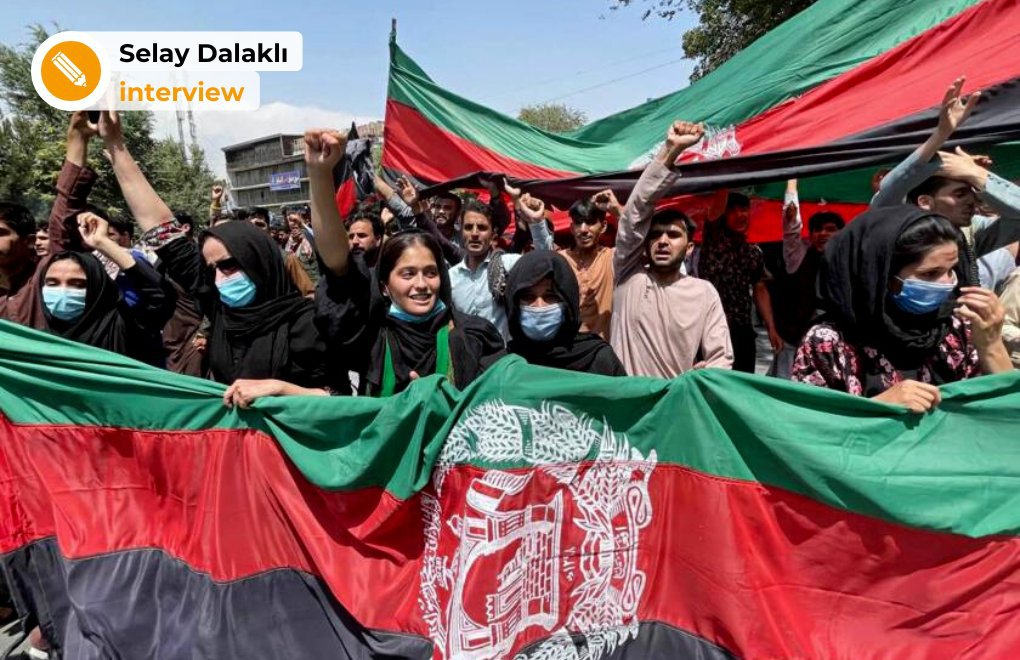* Photo: DİSK
Click to read the article in Turkish
Chaired by Minister of Family, Labor and Social Services Zehra Zümrüt Selçuk, Minimum Wage Determination Commission convened for the third time on December 22 to determine the minimum wage for 2021.
CLICK - Minimum wage negotiations in Turkey: A brief overview
In the meeting hosted by the Confederation of Turkish Trade Unions (TÜRK-İŞ) on behalf of workers, representatives from the Turkish Statistical Institute (TurkStat), the state agency commissioned with producing official statistics on the country, also made an offer and recommended that the minimum wage should be 2,792 lira (~366 USD) next year.
The fourth and final meeting of the commission will be hosted by the Ministry of Family, Labor and Social Services next week.
Ahead of this last meeting, we have spoken with Confederation of Progressive Trade Unions of Turkey (DİSK) Chair Arzu Çerkezoğlu about how the minimum wage and the purchasing power of minimum wage earners have changed in Turkey over the years and how the minimum wage negotiations have been going on since the first meeting on December 4.
Underlining that the minimum wage has turned into an average wage in Turkey, Çerkezoğlu says, "Turkey has a minimum wage that has been significantly deteriorating in terms of purchasing power, that cannot get its share from the national income and that is constantly deteriorating against the dollar, gold prices and inflation" and adds:
"It is not acceptable that 15 people, sitting around a table, make a decision about the lives of millions of people. What we offer as an alternative is to ensure that the minimum wage is determined in a real collective bargaining where all confederations and labor organizations participate."
CLICK - 'Sometimes, we also get surprised at how we live'
'Minimum wage even below starvation level'
How has the minimum wage and the purchasing power of minimum wage earners changed over the years in Turkey, especially amid the COVID-19 pandemic? How do you think the state policies and the attitude of employers have affected this change?
Both the minimum wage and the purchasing power of workers subsisting on minimum wage have deteriorated significantly in Turkey over the years. In fact, all numbers and statistics show how much the minimum wage has deteriorated in Turkey in terms of purchasing power.
There is a minimum wage in Turkey that is constantly deteriorating against the dollar, against gold prices and especially against inflation. This deterioration has now pushed it below the starvation level. There is a minimum wage in Turkey that is below the starvation level, let alone the poverty level. There is a minimum wage deteriorating over the years.
In fact, this can also be understood from some basic figures. When we consider the course of the minimum wage, which has become an average wage, from this perspective, and when we compare it with the per capita income as well as with the dollar, gold prices and inflation rate, we see a serious deterioration. While the share of the labor, the wage earners in the total value, in the value that we produce, i.e. in the per capita income, was around 50 percent in early 2000s, even hitting 52 percent, it dropped as low as 30 percent before the onset of the crisis, before the pandemic.
With the outbreak of the pandemic, this fall has increased further; therefore, the fact that the share of the labor, the wage earners in the per capita income has dropped from 50 percent to 30 percent is, in fact, a basic macro indicator which shows us how the minimum wage, which has become an average wage, has deteriorated over the years.
For instance, based on the gold prices of the Central Bank, a minimum wage earner could afford 25 cumhuriyet (republic) gold coins with his or her annual income 10 years ago; this number has now dropped to 10 coins.
Again, on a dollar basis, the minimum wage was as high as 460 dollars in Turkey in 2006-2007; but, it has now dropped below 300 dollars, in a first. When we compare it with other countries, we have one of the lowest minimum wages among the OECD countries.
'Policies based on suppressing wages'
Without a doubt, the policies of the state, the policies of the government that governs the country and, of course, the attitude of employers are decisive in this entire process. Because even though there is a negotiation process, minimum wage is determined by the government and employers in Turkey. The state and employers' organizations are in the position to determine it and all policies of the state, all policies of the Justice and Development Party (AKP) are oriented towards suppressing wages.
In fact, in all those policy papers, Medium-Term Program, the 100-day economy programs of the Presidency and IMF reports, there is a mindset based on the suppression of wages. For instance, determining the pay rise based on the targeted inflation rate, rather than the realized one, is itself a policy of suppressing wages. As a result of these policies, Turkey has a minimum wage that has been significantly deteriorating in terms of purchasing power, cannot get its share from the national income and is constantly deteriorating against the dollar, gold prices and inflation.
I would like to emphasize a point from our report: In 1978, the minimum wage was 3.5 percent higher than the per capita income; it has now dropped below 40 percent of per capita income in 2020. This is again an indicator showing that the minimum wage cannot get its share from the total value that we produce, from the national income. The main reason underlying this is the government's and employers' policy of suppressing wages.
'1 in 4 women earn less than minimum wage'
When we consider the number/ratio of minimum wage earners, the minimum wage and the purchasing power of minimum wage earners and how they have changed over the years, where do you think Turkey stands in comparison to other countries?
One of the most important things here is really the increase in the number and ratio of minimum wage earners. The obstacles to unionization have grown significantly after the [military coup] on September 12 [1980]; unionization and the number of unions as well as the rate of workers within the scope of collective labor agreements have dropped, which has gradually increased the ratio and number of minimum wage earners in Turkey.
Minimum wage has become an average wage in Turkey. Today, in Turkey, half of all workers, nearly 10 million workers, work for a minimum wage or a wage close to that amount. Therefore, the minimum wage, which is a symbolic wage in several European countries and earned by only 2-3 or 5 percent of workers, is an average wage in Turkey. There are even millions of people in Turkey who cannot get even the minimum wage. Today, 3 million 300 thousand workers cannot even earn this minimum wage, which is even below the starvation level. In fact, the number of workers who work for half of the minimum wage has also reached 1 million.
These ratios are more dramatic in the private sector, especially among women. The ratio of women who cannot get minimum wage hits 25 percent. In other words, one out of every four women gets a wage lower than the minimum wage and one out of every two women have to work for the minimum wage or for a wage below this amount.
Therefore, it needs to be noted that Turkey has become a society of minimum wage earners and minimum wage has become an average wage in Turkey. All this deterioration, namely the existence of this minimum wage which has both become an average wage and significantly deteriorated, has turned Turkey into one of the countries with the lowest minimum wage.
When we consider the 2020 annual averages on a dollar basis, only three OECD countries have a lower minimum wage than Turkey, namely Serbia, Bulgaria and Albania. But when we consider the current exchange rate of dollar, only Albania has a slightly lower minimum wage than Turkey while the others are all higher. So, on the one side, there is a minimum wage that has become an average wage; and, on the other side, Turkey is one of the countries with the lowest minimum wage.
'State's biggest collective agreement with society'
Making a statement before the minimum wage negotiations began, the TÜRK-İŞ announced that it was working jointly with the other confederations, DİSK and Hak-İş. How is DİSK involved in this process and how is it working in coordination with other confederations?
The Minimum Wage Determination Commission consists of 15 people, this is not democratic. The process of determining the minimum wage in Turkey is, in fact, the biggest wage bargaining, the biggest struggle for sharing in the country. As I said earlier, this is an average wage and is a concern of millions of people. Therefore, seen in this light, it is the biggest wage bargaining, but it is unfortunately not determined in a democratic way. The Minimum Wage Commission consists of 15 people: Five representatives from workers, five from employers and five from the government.
As the TÜRK-İŞ is the confederation with the highest number of members, it participates in this process, we are not at the table of minimum wage determination commission in person. But, as we also did last year, we have once again released a joint statement as the TÜRK-İŞ, DİSK and Hak-İş confederations as to the fundamental principles concerning the determination of the minimum wage, especially amid the pandemic.
In other words, by signing a joint declaration as three confederations, we have announced it to the public that the minimum wage should be determined in such a way that it will conform to the international standards, suffice for a worker to make ends meet with his or her family, compensate the losses incurred over the years and especially be exempt from taxes and cuts. We have actually announced it to the government as well.
Even though we have not voiced a joint figure -as every confederation might have its own method of calculation- the standards of the minimum wage will come out within the frame of these principles.
'We are a party to this process'
TÜRK-İŞ attended the meetings within this framework, three meetings have been held so far and we have been in contact in this process. The presentations and information at the meetings have been shared with us as well. In other words, we have been in coordination.
The joint statement of these three confederations is also important, we stand behind it and think that we, as the DİSK, are a party to this process. We might not be at the table, but we call this process of determination as the biggest collective agreement process of the state with society and, seen from this perspective, we, as the DİSK, are a party to this process.
We also do not see this determination process solely as a bargaining around a table; for this reason, we have been getting involved in this process with the reports that we have released and the protests that we have held in workplaces, squares and streets. We, as the DİSK, are determined to organize our demands, our demand for a minimum wage compatible with human dignity, as a social party and to raise this demand with our all fellow workers, unionized or non-unionized alike. We consider the joint statement of the three confederations to be important. In that sense, standing behind this will, we are calling on everyone to raise this demand.
'TurkStat offer not suit Turkey's realities'
The minimum wage determination negotiations began on December 4 and the third meeting was hosted by the TÜRK-İŞ on December 22. What would you like to say about the meetings so far?
Three meetings have been held so far and the meetings began on December 4. Before the first meeting on December 4, we made a joint statement as three confederations. Then, we, as the DİSK, staged protests in front of tax offices across Turkey and raised our demand for the minimum wage's exemption from taxes. Then, we protested in front of workplaces.
And, today (December 22), we protested in front of regional directorates of labor. We are trying to be involved in this process from workplaces and squares, we are trying to increase this involvement.
The three meetings, in fact, continued with the routine procedure. The Ministries of Treasury and Finance and Trade, employers' union and the TurkStat made their presentations. The last meeting where the final decision will be made is scheduled for next week.
The Turkish Statistical Institute (TurkStat) presents a figure at the third meeting every year. Yesterday (December 22), TurkStat presented this figure. It said that in order for a worker to make ends meet in 2021, he or she has to have a minimum wage of 2,792 lira. Last year, TurkStat announced this figure as 2,331 lira, so with a nearly 20-percent increase.
This figure is, of course, not a figure that will meet the expectations of workers, it is not a figure that suits the realities of Turkey. But TurkStat calculates this figure based on a single worker; in other words, the institute announces the minimum subsistence level of a single worker.
But this is not the minimum wage. A minimum wage is a wage with which a worker can make a living with his or her family.
When we look at it from this perspective and take the TurkStat's figure of 2,792 lira for a single worker together with the family, it confirms DİSK's minimum wage demand of 3,800 lira. Because a minimum wage should suffice not only for a single worker to make a living, but it should also suffice the family to pay its rent, kitchen expenses, electricity, water and natural gas bills, the school expenses of children, their clothes and shoes... Based on these calculations, we say that the minimum wage should be 3,800 lira next year, which is a scientific data. We also shared our methods of calculation with the public. So, we keep on raising the struggle for this.
'A wage compatible with human dignity'
With the report of "Minimum Wage Reality in the Days of Outbreak" prepared by the Research Center of the DİSK, the confederation's minimum wage demand has also been shared with the public. What result should we consider a gain for minimum wage earners when the negotiations come to an end?
Our report is entitled "Minimum Wage Reality in the Days of Outbreak" because the minimum wage in the year 2021 is more important than ever before. On the one side, there is the economic crisis; on the other side, there is a serious impoverisment brought about by the pandemic. The expenditures of households have been increasing and the income injustice has become even more aggravated in Turkey.
The most basic social policy that will eliminate all these is the minimum wage. For this reason, we have been calling on the political power holders to social state and social policy. Minimum wage is the most basic tool for that and, thus, 3,800 lira, which we demand based on scientific grounds, should be determined as the minimum wage in 2021.
In that sense, a figure that is near the one we have recommended would be a gain on the part of workers. But, more precisely, beyond being a gain, it is a necessity to live, it is a necessary level to lead a humane life. Therefore, we are struggling for a wage compatible with human dignity. Because working, the right to work and earning a wage compatible with human dignity in exchange for this work is a right and we are waging a struggle for this.
'No wage equity without tax equity"
What will happen if the minimum wage negotiations end with an unfavorable result for workers and labor unions? What course of action will the DİSK take in this case?
Minimum wage is a very basic determinant in terms of our struggle for transformation and a wage that we can lead a humane life with. That is why, we attach a great importance to this process; we keep on organizing it across Turkey and keep making our calls to the government.
But if we cannot get the result that we want and if the government's policy of suppressing wages remains in effect, this will pave the way for an extremely negative process for millions of people, for 83 million people. Therefore, we will continue struggling for a wage that we can lead a humane life with, we will maintain our union organization to the end.
It is also a very fundamental part of our struggle for wages to ensure that the wages are exempted from taxation and a just tax system is established. Because we say that there cannot be any wage equity if there is no tax equity, so we will keep struggling for a just tax system in Turkey.
We will also continue struggling to ensure that the household budget is supported by removing the indirect taxes on necessary expenses such as electricity, water, natural gas bills and staple food, which have become very important especially amid the pandemic, and levying zero Value Added Tax and Special Consumption Tax.
Therefore, our struggle for a wage which is compatible with human dignity will, without a doubt, continue to the end. We will develop policies, concrete demands and programs for this and follow such a path.
'Minimum wage is not democratically determined'
What would you like to say about the procedure for determining the minimum wage and the functioning and structure of the commission in Turkey? Does the DİSK have an alternative to offer to this procedure and the organization of the commission?
As I said earlier, minimum wage is a very symbolic wage in European countries and most OECD countries, it is sometimes not really high on the agenda of entire society and unions, in contrast to Turkey, because it is an extremely symbolic wage there. But, in Turkey, minimum wage is an average wage and, thus, the procedure for determining it is very important.
But the minimum wage is not determined in a democratic way in Turkey. What I mean is: It is not acceptable that 15 people, sitting around a table, make a decision about the lives of millions of people.
What we offer as an alternative to this is to ensure that the minimum wage is determined in a real collective bargaining where all confederations and labor organizations participate. When we underline the collective bargaining... The minimum wage must be determined in a collective bargaining in the full sense of the term where workers have the right of strike in the event of a dispute, as has to be the case in collective bargaining processes.
Otherwise, a minimum wage that is determined by 15 people sitting around a table and making decisions about millions' lives by majority of votes and, most of the time, jointly by the government and employers, cannot be accepted. That is why, it is is deteriorating to such an extent.
'Government is in a position to determine the wage'
Government officials sometimes say that they are arbitrators in this process; but, in Turkey, the government is in no way in the position of an arbitrator, it is directly a party, it is even in the position to determine it.
Especially after the Presidential Government System was adopted, the Minimum Wage Determination Commission has been directly affiliated with the Presidency as per the Presidential decree no. 1 dated July 10, 2018. Therefore, the government and political power holders are directly a party to this process, they are in the position to determine it.
In fact, when we look at the minimum wages over the years, we see that they were, most of the time, determined jointly by government and employers.
So, the process for determining the minimum wage is in no way democratic, just as it has nothing to do with collective bargaining; it is not even a real negotiation process. What needs to be done is to determine it in a real collective bargaining process where all unions, confederations and labor organizations have a say and there is the right of strike in case of a dispute.
It will be only then possible to talk about a minimum wage that will suffice people to make a living, eliminate the losses over the years, suit the economic situation of the country and get its share from national income.
Is there anything else that you would like to add?
As a last word, I would like to say that demanding a minimum wage which is compatible with human dignity is a right and, thus, we call on everyone to raise this struggle shoulder to shoulder. (SD)



















.jpg)
